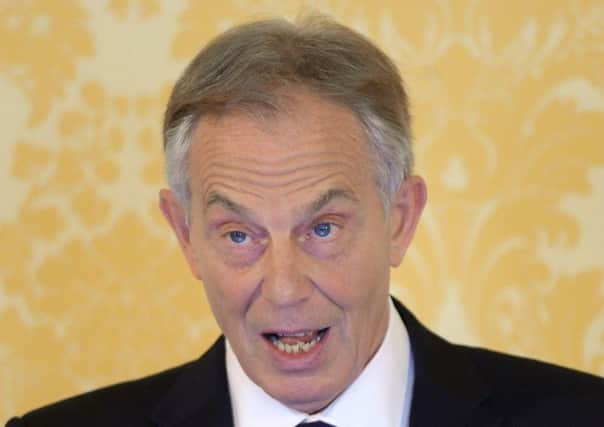YP Comment: Tony Blair is guilty of putting the USA before Britain


“I WILL be with you, whatever.” These six words – written by a messiah-like Tony Blair to President George W Bush eight months before the ill-fated invasion of Iraq – will go down in history as the former prime minister’s political epitaph.
Damning evidence of the then premier’s evangelical self-righteousness, they reveal the extent of Mr Blair’s solidarity with the United States and a misguided belief that all the world’s problems could be solved by military bombardment alone.
Advertisement
Hide AdAdvertisement
Hide AdNeither leader could have been more mistaken – or naive – as Sir John Chilcot’s report, six years overdue, revealed the flawed procedures which fuelled a politically-driven humanitarian catastrophe.
It’s sobering to think that more innocent victims – 250 and counting – were blown up in Sunday’s suicide bombings in Baghdad more than 13 years after Shipley’s Steve Roberts became the first of 179 British service personnel to die in action.
It’s chilling to realise that the terror unleashed on a fragile world in March 2003 would be so brutal that 160,000 Iraqi civilians, the people being liberated from tyranny, have already lost their lives while millions of their compatriots have been displaced.
And it is disturbing to think that the decision to overthrow Saddam Hussein, on the basis that he possessed weapons of mass destruction which proved to be non-existent, prompted a chain reaction which has made the world less safe and inspired a generation of jihadists and sectarian terrorists who remain intent on unleashing revenge against the West.
Advertisement
Hide AdAdvertisement
Hide AdIf only the late Robin Cook, the then Leader of the Commons who resigned in principled opposition to a war without purpose, was still alive to hear this vindication. Or Charles Kennedy who suffered torrents of personal abuse because the Lib Dems opposed military action.
Far from being appeasers of terrorism, the unjustifiable accusation that they faced at the time, they were men of peace who showed great foresight in challenging the cosy consensus which existed at the time between Labour and the Tories as well as Britain and America.
Of course the world – and foreign policy – changed on September 11, 2001, when America and the West suffered terrorist acts without parallel in peacetime. Yet these lethal acts of provocation did not justify Mr Blair, or America, from following due process before committing the military to a war with inadequate equipment and, shamefully, no definitive plan to secure the peace once Iraq’s dictatorship had been toppled.
No amount of hand-wringing can absolve a pious and self-serving Mr Blair from the fact that he took Britain to war on the basis of flimsy intelligence at best while withholding the Attorney General’s challenging legal advice from the Cabinet, presumably because he could not go back on his pre-ordained pledge to President Bush.
Advertisement
Hide AdAdvertisement
Hide AdOne word – Iraq – will define his legacy and his faux sincerity bordered upon the delusional as he launched an extraordinary self-justification. At least the Chilcot team saw through this posturing, even though it should never have taken seven years for their findings to become public. The only consolation – and it is a scant one – is that this report cannot be written off as an establishment whitewash.
Quite the opposite. It is a devastating critique which shows how Mr Blair, and his acolytes, believed the intelligence – and their own hype – without thinking through the consequences, not least on how Iraq could be turned into a beacon of democracy after decades of repression. As paragraph 877 says: “Public statements on the extent of the UK’s ambition should reflect a realistic assessment of what is achievable. To do otherwise is to risk even greater disillusionment and a loss of UK credibility.”
It was as if Mr Blair and those privileged to be part of his sofa government were treating the future security of the world on a par with a chillaxing afternoon in the 10 Downing Street bunker playing the boardgame Risk.
A truly contemptible betrayal of the national interest, at least David Cameron’s decision to create a National Security Council means that future premiers will not be able to abuse their power.
Advertisement
Hide AdAdvertisement
Hide AdHowever Mr Cameron did make one key distinction. It’s important that the wrong lessons are not learned from Chilcot and that there might still be cases where military intervention is justifiable. That might be so – but his successors will have to prove that all diplomatic avenues have been exhausted, the legality of war is assured and that a post-conflict plan is in place. If only a teary Tony Blair had followed these tests of humanity and statesmanship rather than committing Britain to a war that will always be a stain on this country’s conscience, despite the heroic efforts of the valiant Armed Forces whose courage and bravery never faltered in the most difficult of circumstances.